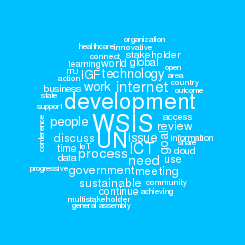ITU: Strengthening the impact of WSIS action lines for sustainable development: showcasing best practices, transferring know-how, and fostering partnerships
Event report
Panellists in this ITU-organised session underlined that much has changed since the 2003-2005 WSIS phases and that everyone now understands how important ICTs, and the Internet in particular, are for enabling sustainable development across all sectors of society, as well as for empowering the exercise of fundamental freedoms and human rights. While the WSIS Geneva and Tunis documents established ambitious goals and action lines, and progress has been made over the past ten years in bringing ICTs to more people in the world, work needs to continue, on a sustained basis, to ensure that everyone can take full advantage of the opportunities offered by ICTs. Most panellists suggested that creating strong links between the WSIS action lines and the sustainable development goals would significantly contribute to achieving both the WSIS objectives, and the goals of the 2030 Agenda for Sustainable Development.
It was noted that in the new digital world, ‘equality of chances starts with connectivity’, and that all stakeholders have the role and responsibility to work together, in a multistakeholder environment, to create the conditions for such connectivity. The example of public-private partnerships in national broadband plans was offered in this regard: research shows that such partnerships have made significant differences in the countries where they were put in place, with governments setting the goals, and the private sector investing in building physical infrastructure. It was further explained that actions on the supply side (i.e. provision of access to infrastructure) need to be supplemented by actions of the demand side, to ensure affordability of access, to build capacity and develop digital skills, and to reduce and eliminate other forms of digital divide, such as the gender gap. Various countries provide examples of locally relevant good practices in this regard, and while there is no one-size-fits-all solution, countries can learn from each other and adapt good practices to their local needs and realities.
Looking at the future, panellists noted that as we move from an information society to a digital society, we undergo fundamental changes in the way we live, govern, and interact with each other. The Internet, with its transnational character and its continuous evolution, poses challenges for existing governance frameworks. In this context, we should start looking not only at who is at the table, but also at how we can work together to ensure the success of the Internet as an open, inclusive, and secure space for development, unity, equality, and innovation. Different actors need to agree on sets of principles for achieving this aim, as well as to create issue-specific networks of stakeholders that can help contribute to defining the future of the Internet.

